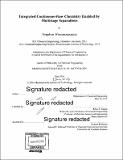Integrated continuous-flow chemistry enabled by multistage separations
Author(s)
Weeranoppanant, Nopphon
DownloadFull printable version (12.93Mb)
Other Contributors
Massachusetts Institute of Technology. Department of Chemical Engineering.
Advisor
Klavs F. Jensen.
Terms of use
Metadata
Show full item recordAbstract
Flow chemistry is becoming an accepted method of continuous synthesis with its considerable advantages over batch chemistry, such as smaller infrastructure, faster production, and safer operation for aggressive reactions or extreme conditions. However, to realize the full benefits of flow chemistry in multi-step reactions, continuous work-up techniques are needed. They will eliminate intermediate batch work-up steps that are often inefficient and time-consuming. This thesis describes the development of continuous liquid-liquid extraction and evaporation techniques along with their integration in multistep reaction sequences and purification on the mL/min scale. Fully-integrated syntheses for active pharmaceutical ingredients (APIs), lidocaine and fluoxetine, were studied in detail. These two examples represent two different strategies for integrating multistep reactions. Sequential reactive steps in the lidocaine synthesis were designed to be compatible without any separation, while in-line purification, liquid-liquid extraction, was required for the fluoxetine synthesis. The key outcome of this work was the construction of a compact, reconfigurable system for manufacturing four different APIs, at throughput of hundreds to thousands dosages per day. The system represents a significant advance in continuous manufacturing by demonstrating feasibility of facility decentralization and on-demand production. Another significant accomplishment of this thesis is the development of multistage liquid-liquid extraction using liquid-liquid membrane-based separators that enable highly efficient continuous extraction. While previous efforts have demonstrated a single stage or, at most, a few stages in crosscurrent configuration, the objective was to build a countercurrent extraction setup in the context of laboratory scale (i.e. mL/min). The setup was made possible with an integrated pressure control element, allowing non-precise interstage pumping to be employed. This setup was found effective for a wide range of industrially-relevant applications, from multicomponent solvent recovery to in-line removal of phase transfer catalysts. The thesis provides opportunities for future directions. For example, improvement in unit operations, such as pumping, solid handling, evaporation, and process control, will be needed to reach the potential of flow synthesis. The countercurrent extraction setup can be automated for faster screening and optimization of extraction conditions as well as be applied to complex processes, such as reactive extraction and enantioseparation.
Description
Thesis: Ph. D., Massachusetts Institute of Technology, Department of Chemical Engineering, 2016. Cataloged from PDF version of thesis. Includes bibliographical references (pages 79-85).
Date issued
2016Department
Massachusetts Institute of Technology. Department of Chemical EngineeringPublisher
Massachusetts Institute of Technology
Keywords
Chemical Engineering.